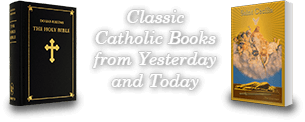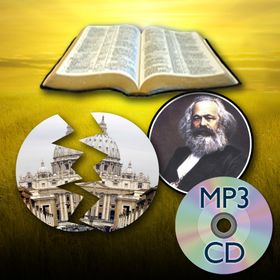Categories
Information
Audio Format: Mp3 CD
Total Running Time: 5 hours, 29 Minutes
Douglas Bersaw provides a comprehensive course on the three fundamental errors of our own time: Americanism, Modernism, and Socialism. Every Catholic concerned about the state of the modern Chruch cannot have a full understanding of what's going on until he studies these three problems.
The encyclicals studied are: Testem Benevolentiae of Leo XIII, Pascendi Domenici Gregis by Pope Saint Pius X, and Quadragesimo Anno by Pius XI, which condemns Socialism and unrestrained capitalism.
The lectures included are as follows:
1.)Course Introduction
2.)Testem Benevolentiae of Leo XIII
3.) Americanism Defined
4.) The Roots of Americanism
5.) Modernism Defined
6.) Pascendi Domenici Gregis of Pope Pius X
7.) The Mind of the Modernist
8.) Modernism: the Evolutionist Heresy
9.) Pius X and his Fight Against Modernism
10.) The Modernist and Apologetics
11.) Lamentabili of Pius X
12.) The Remedy to Modernism
13.) Introduction to Socialism
14.) Socialism; Course Conclusion
This is one of numerous courses given over many years, from the late 1980’s until the new century began by Douglas Bersaw.
He and Br. Francis M.I.C.M., the superior of the Slaves of the Immaculate Heart of Mary at Saint Benedict Center in Richmond New Hampshire, drove together to the Boston area, where Saint Benedict Center was founded, in order to give classes every Thursday night. These classes were given as part of a program of education established by Br. Francis for the training of Catholic lay apostles who wished to work for the conversion of America to the Catholic religion, and which is known as the Saint Augustine Institute of Catholic Studies.
These classes lasted between 60 minutes and 90 minutes, and for many years the time was shared by both teachers. Eventually, due to age and disability, Br. Francis ceased his travels, but he had Mr. Bersaw continue the work on his own. Due to the lack of sophisticated recording equipment and various deficiencies of the recording circumstances, the quality of all of the recordings is not perfect. Modern digital enhancement has helped somewhat to remedy this.
These classes are the portion of the evening that was presented, under Br. Francis’ inspiration and at his direction, by his Third Order disciple. There are moments in these talks where Br. Francis is referred to. We decided not to edit out these references (even though the references may seem out of place now that the courses have been separated) but simply to let the listener know to whom they refer.



